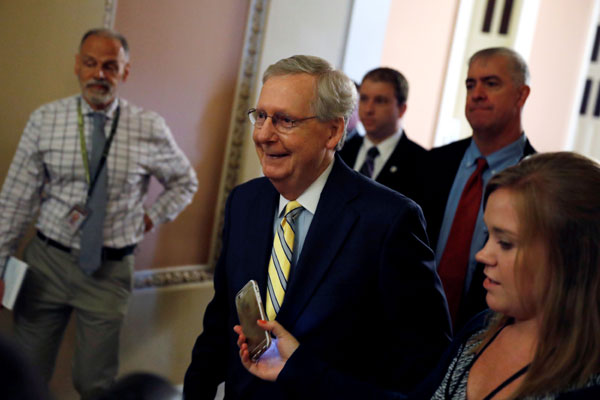
July 13 – Senate Republican leaders released an updated version of their healthcare bill on Thursday that would dismantle Obamacare after an attempt to bring an earlier version of the legislation to a vote fell apart amid an intraparty revolt.
The new version of the bill did little to assuage concerns of moderate Republicans, who worried that its deep cuts to Medicaid would harm their most vulnerable residents. Two Republican senators said they would not even vote to open debate on the bill. Senate Majority Leader Mitch McConnell can only afford to lose two of his party’s 52 Republicans, with Vice President Mike Pence ready to cast a tie-breaking vote.
The Senate added a number of changes to the bill in an attempt to win more support. Here are the main provisions of the new version of the bill:
SKIMPIER INSURANCE PLANS
The bill contains an amendment from conservative Republican Senator Ted Cruz that would allow insurers to sell stripped-down, low-cost insurance plans that do not comply with Obamacare’s requirement that insurers cover a set of 10 essential health benefits. Those benefits include maternity and newborn care, mental health services and addiction treatment, outpatient care, hospitalization, emergency room visits and prescription drugs.
Insurers are strongly opposed to the amendment, which they say would raise insurance premiums for sick people, destabilize the individual insurance market and undermine protections for those with pre-existing medical conditions.
Senior Republican Senate aides said the nonpartisan Congressional Budget Office (CBO) would assess a version of the legislation with the amendment, and one without it.
TAXES
The bill retains two key taxes on the wealthy created by Obamacare to help pay for other provisions in the legislation. It keeps a 3.8 percent net investment income surtax for individuals earning more than $200,000 and couples earning more than $250,000, and a 0.9 percent surtax for the Medicare insurance program for the elderly on people with those incomes.
It also keeps Obamacare’s limits on corporate tax deductions for executive pay in the health insurance industry.
Those earning between zero and 350 percent of the federal poverty level are eligible for tax credits under the proposal, but the credits are generally less generous than those provided under Obamacare. Under Obamacare, those earning between 100 and 400 percent of the federal poverty level are eligible for tax credits.
As with the earlier version, the bill repeals several Obamacare taxes, including on the pharmaceutical, medical device and health insurance industries. It also repeals a fine on individuals who do not purchase health insurance, as well as a penalty on employers who do not provide health insurance.
MEDICAID
The bill leaves in place an overhaul of the Medicaid government health insurance program for the poor. Moderate Republicans had been hoping the updated version would soften the cuts, which they said would devastate their most vulnerable residents.
The bill unwinds Obamacare’s Medicaid expansion over three years, from 2021 to 2024. But it goes beyond repealing Obamacare by imposing drastic cuts to Medicaid that deepen in 2025. The CBO estimated the bill would cut Medicaid by nearly $800 billion by 2026, and would cut Medicaid 35 percent come 2036.
ADDITIONAL FUNDS
The bill contains an additional $45 billion for the opioid epidemic that has devastated parts of the United States, including West Virginia, Ohio and Pennsylvania. That is on top of the $2 billion included in the previous version of the bill.
The legislation also contains an additional $70 billion beyond the $112 billion in the earlier version for states to help insurers keep down rising insurance premiums and help lower-income insurance holders cover out-of-pocket medical expenses.


